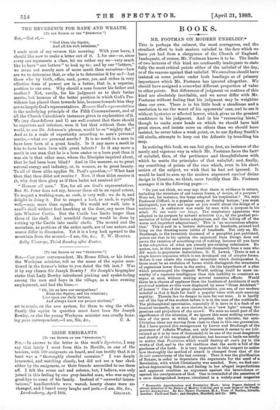THE REVERENCE FOR RANK AND WEALTH.
[TO TEE EDITOR OF TEE "SPECTATOR."]
Sin,—Out of,—
" God bless the Squire,
And all his rich relations,"
I made most of my sermon this morning. With your leave, I should like now to make a letter out of it. I, for one—or, since every one represents a class, let me rather say we—very much like to have " our betters " to look up to ; and by our "betters," we mean not merely men of more merit than ourselves—how are we to determine that, or who is to determine it for us P—but those who by birth, office, rank, power, yes, and riches (a very effective form of power) are in a better, that is, a superior, position to our own. Why should a man honour his father and mother ? Not, surely, for his judgment as to their better merits, but because of the better position in which God's Providence has placed them towards him, because towards him they are so largely God's representatives. Honour God's representatives is the underlying principle of the Fifth Commandment, and of all the Church Catechism's instances given in explanation of it. We (my class-fellows and I) are well content that there should be superiors and inferiors, were it but that without them the world, to use Dr. Johnson's phrase, would be so " mighty flat" And as to a scale of superiority according to men's personal merits,—what are personal merits P It is no merit in a man to have been born of a great family. Is it any more a merit in him to have been born with great talents ? Is it any more a merit in one man that ho is a born orator or a born poet than it was sin in that other man, whom the Disciples inquired about, that he had been born blind P And in like manner, as to great natural energy and industry, or, in women, as to great beauty. To all of these alike applies St. Paul's question,—" What hast thou that thou didst not receive P Now, if thou didst receive it it, why dost thou glory as if thou hadst not received it?"
"Honour all men." Yes, for all are God's representatives. But St. Peter does not say, honour them all to an equal extent. To respect a working-man, as such, is very well ; we do it, and delight in doing it. But to respect a lord, as such, is equally well,—nay, more than equally. We would not walk into a snail's shell without first knocking at the door, any more than into Windsor Castle. But the Castle has limits larger than those of the shell. And manifold damage would be done by cutting up the Castle into snails' shells. The mound and the mountain, as portions of the entire earth, are of one nature, and scarce differ in dimension. Yet it is a long look upward to the mountain from the mound.—I am, Sir, &c., F. W. HARPER.
Selby Vicarage, Third Sunday after Easter.


































 Previous page
Previous page